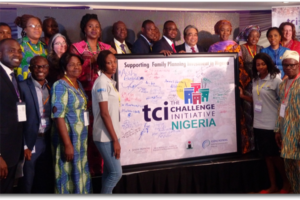 The Gates Institute at the Johns Hopkins Bloomberg School of Public Health and the Federal Ministry of Health on February 23 formally launched the Nigeria Hub of the Challenge Initiative (TCI), a global program that aims to have a dramatic impact on reproductive health for underserved poor communities.
The Gates Institute at the Johns Hopkins Bloomberg School of Public Health and the Federal Ministry of Health on February 23 formally launched the Nigeria Hub of the Challenge Initiative (TCI), a global program that aims to have a dramatic impact on reproductive health for underserved poor communities.
Access to voluntary family planning has been proven to have transformative impacts on communities and countries to promote health and prosperity. Family planning information and services give women, men, couples and adolescents the opportunity to prevent unintended pregnancy and choose whether and when to have a child – unlocking their future opportunities.
Nigeria demonstrated its commitment to family planning with the National Blueprint for Family Planning in 2014, which aims to achieve a national contraceptive prevalence rate (CPR) of 36% by 2018, to reposition the family planning/child birth spacing program on its investment agenda and to ensure that all women of reproductive age (15-49 years of age) have unhindered access to modern family planning/child birth spacing methods of their choice. This sets the stage to ensure the necessary shift in family planning/child birth spacing programming at the structural, service, and community levels.
The Hon. Minister of Health, Prof. Adewole made a bold commitment to family planning during the November 2016 national family planning conference in Abuja when he said “our commitment is that in spite of the downturn in the economy we would continue to meet all our obligations…. to put $3 million (USD) per year and for 2017 we will increase it to $4 million (USD).”
The Initiative builds on the success of the pioneering Nigerian Urban Reproductive Health Initiative (NURHI) that contributed to an increased CPR (average of 11.5 percentage points) in six cities (FCT, Ibadan, Ilorin, Kaduna, Benin, and Zaria). The second phase of NURHI will contribute to the achievement of the national family planning goal of 36% CPR by 2018 in Kaduna, Lagos and Oyo States.
The Challenge Initiative’s Nigeria Hub will encourage states to invest their own resources in family planning/child birth spacing, and to implement proven strategies and models, such as NURHI. TCI is designed with these innovative features:
- Demand-driven and city-led: Cities choose to participate and run their program with support from the Initiative
- Access to a Challenge Fund: A highly leveraged investment platform that enables donors to support effective urban programs
- Entrepreneurial approach: Regional accelerator hubs operate on lean funding and build in efficient and cost-effective programming
- TCI University: This learning platform offers orientation and practical support, including program tools, training sessions, technical coaching and continuous learning through a community of practice
- Visionary financing framework: The Initiative’s technical assistance and development financing offers a novel approach that can be used for other sectors
The Challenge Initiative is a new paradigm for expanding proven solutions to new locations.
“The Challenge Initiative offers a unique approach because interested Nigerian cities self-select to participate in the Initiative and bring their resources to the table in order to leverage significant resources and be able to provide high quality family planning and reproductive health services to those in need,” said Mojisola Odeku, Portfolio Director of NURHI.
Interested states or cities make proposals to implement a package of family planning interventions that are cost-effective and customized to their urban needs and circumstances, developed with assistance from the Initiative. Cities with the most promising proposals will receive technical expertise from the Nigeria accelerator hub anchored by the Johns Hopkins Center for Communication Programs for project design and implementation, as well as financial support from the Initiative’s Challenge Fund.
The launch of The Challenge Initiative in Nigeria creates a synergy of actions among key players in reproductive health in Nigeria and showcases the Initiative to potential beneficiaries, funders, and partners, including representatives from local philanthropic organizations, foundations, and corporations.
With the Challenge Initiative, participating Nigerian states will be able to meet the growing demand for voluntary family planning/child birth spacing, particularly among the urban poor, and break the cycle of poverty. Family planning and reproductive health gives women, families, and communities a brighter future.
“The Challenge Initiative (TCI) Nigeria will work with states to apply the winning formula of success based on interest and readiness to adapt the NURHI model or any slice of the model for change” said Dr. Victor Igharo, Program Manager of The Challenge Initiative Nigeria.


